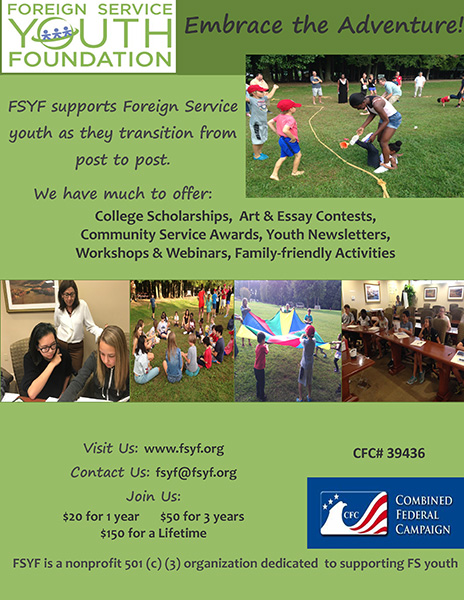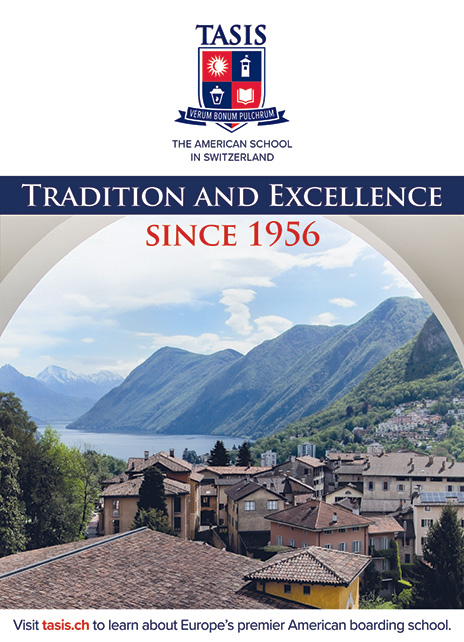2021 Awards for Exemplary Performance
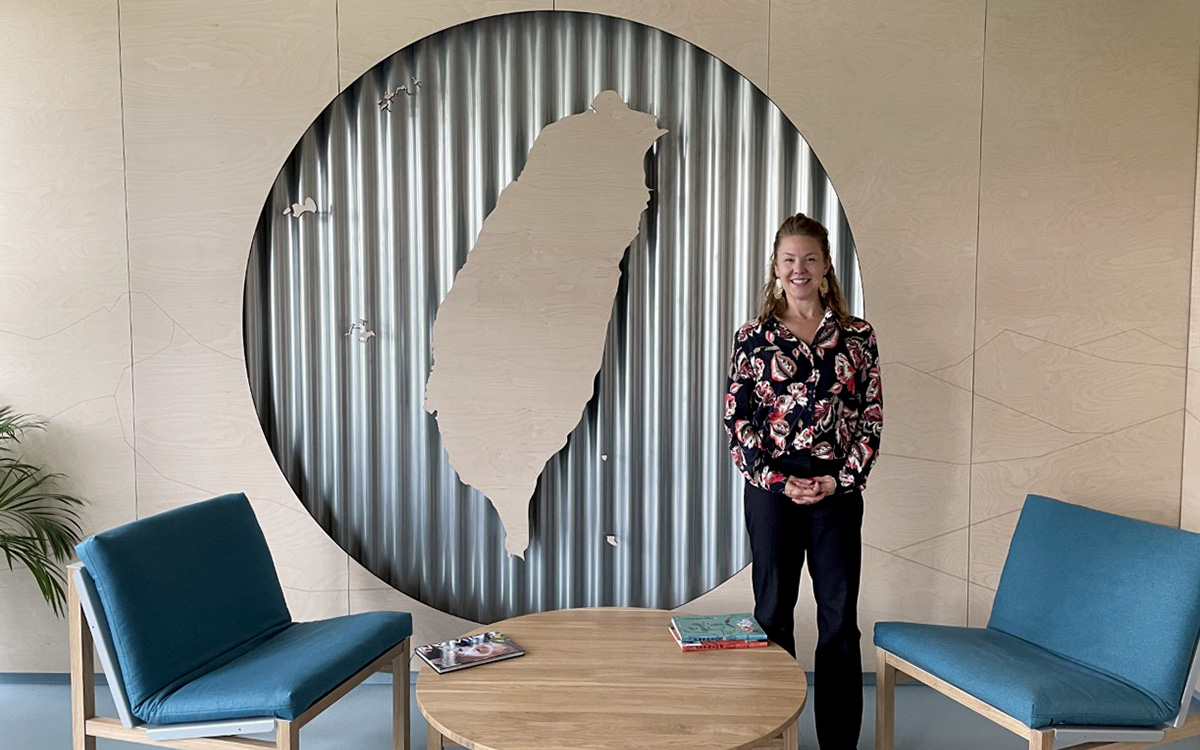
Erika Kuenne visits the Taipei Economic and Cultural Office in Prague, Czech Republic, in 2021.
Mark Palmer Award for the Advancement of Democracy
ERIKA KUENNE: CHINA WATCHER BUILDS SUPPORT IN EUROPE FOR DEMOCRATIC TAIWAN
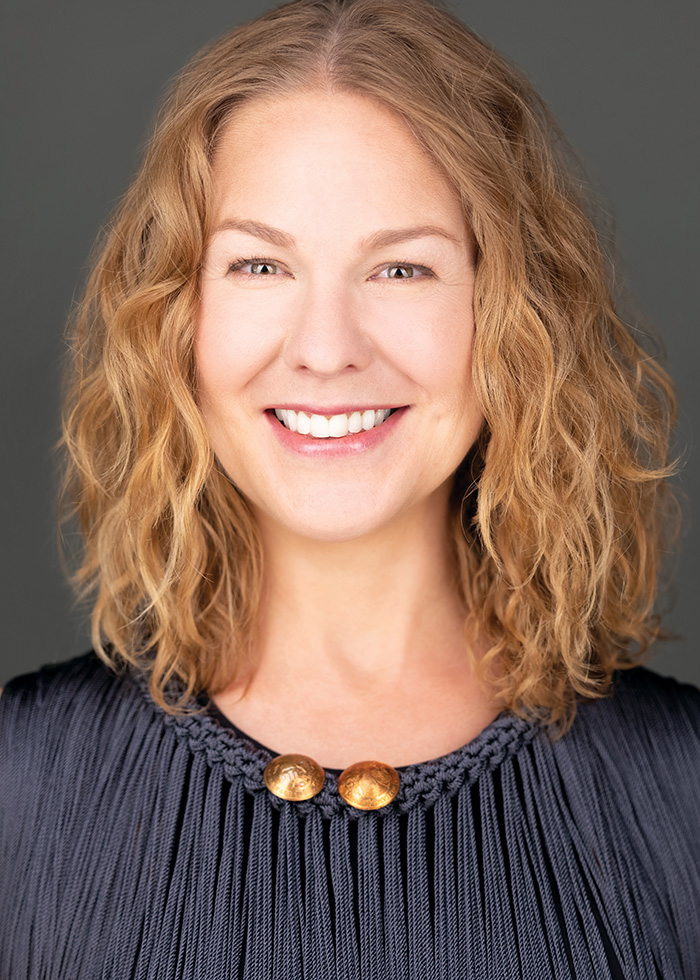
Erika Kuenne.
Erika Kuenne led Department of State efforts to support Taiwan, a democracy under daily pressure from China, and to counter Chinese efforts to undermine democratic values by systematically violating the human rights of the Uyghur ethnic group.
While serving in Prague as the first regional China officer (RCO) for Europe from 2019 to present, Ms. Kuenne encountered bureaucratic obstacles to U.S. diplomatic efforts to create international space for Taiwan. Having studied in Taipei as a Fulbright scholar, Ms. Kuenne says, she was thrilled to undertake initiatives in support of this model democracy. Until last year, State Department guidelines for interacting with Taiwanese officials hampered U.S. engagement. Recognizing the confusion this created, Ms. Kuenne worked with colleagues to develop a script for briefing China watchers throughout Europe on best practices for strengthening interaction with Taiwan.
Kuenne worked with Czech planners and Arati Shroff at the American Institute in Taiwan to facilitate an 89-person Czech delegation to Taiwan in August 2020, which included the highest-level Czech politician ever to visit the country. To counter China’s threatened retaliation, Ms. Kuenne successfully advocated for then–Secretary of State Mike Pompeo to deliver a speech to the Czech parliament emphasizing U.S. appreciation for the Czech Senate’s upcoming trip to Taiwan, sending a signal globally that the United States stands by its partners. The Czech Senate subsequently voted unanimously in favor of Taiwan’s admission as a member to the World Health Organization.
Building on the Secretary’s visit, Ms. Kuenne created a model of subregional engagement on Taiwan with the Czech Republic, Hungary, Poland and Slovakia. This multilateral format was so successful that the State Department is replicating the approach to share Taiwan’s experience as a vibrant democracy defending against authoritarian influence in all regions of the world. Ms. Kuenne also met with embassy colleagues across Europe to dispel misconceptions about working with Taiwan, which led to additional engagements across the continent.
In a meeting with EUR Deputy Assistant Secretary Molly Montgomery in April 2021, Taipei Economic and Cultural Representative Office Representative Liang-yu Wang singled out Ms. Kuenne, expressing not just personal admiration but all of Taiwan’s appreciation “for all Erika has done.” The representative acknowledged that she laid groundwork for Taiwan to work systematically with the United States “to expand relations with European democracies.” Taiwan has already seen a noticeable uptick in its involvement in the Baltic region, especially in Lithuania, which plans to open a representative office in Taipei by the end of 2021. This decision came about in no small part due to Ms. Kuenne’s relationships with officials in that country and her tenacious advocacy to expand Taiwan’s unofficial ties.
Ms. Kuenne’s creative and effective work in Prague led directly to a new congressional allocation of $2 million in public diplomacy funds for RCOs.
Kuenne also worked tirelessly to urge concrete action opposing China’s human rights abuses against Uyghurs in Xinjiang, arguably the most pernicious in the suite of malign activities by which Beijing undermines democratic norms including the rule of law, due process and fundamental fairness. To raise awareness of these abuses, Ms. Kuenne devised Twitter messaging on Xinjiang for the White House and the Secretary of State in the Uyghur language, and secured global publicity for groundbreaking reports outlining China’s human rights abuses.
She collaborated with Germany’s largest newspapers to publicize satellite imagery showing prison labor conditions in Uyghur reeducation camps and coordinated a traveling photo exhibition that exposed hundreds of thousands to Beijing’s repressive human rights record. Beyond Europe, Ms. Kuenne provided indispensable assistance in creating successful speaker programs to raise awareness of the Uyghur plight among colleagues, journalists and think-tanks in Africa, Latin America and the Middle East.
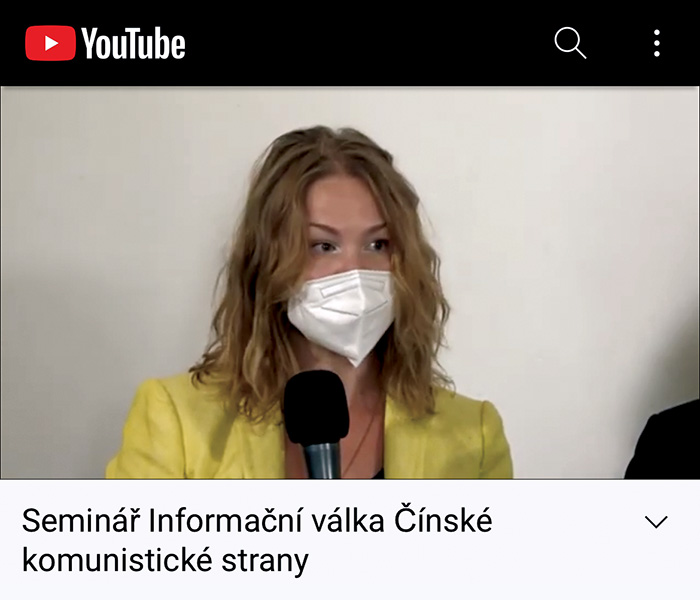
Erika Kuenne speaks at a workshop titled “Information Warfare of the Chinese Communist Party and PRC Wolf Warrior Diplomacy” in Prague, Czech Republic, in July 2021.
Assessing that U.S. missions needed better guidance on how to work with Uyghur diaspora populations, Ms. Kuenne, in cooperation with China Watcher Che Lee, crafted departmentwide guidance on the topic. She curated a slate of Uyghur-themed programming options, ranging from “Poetry as Political Resistance” to “Digital Autocracy in Xinjiang,” which paved the way for embassies to engage more effectively.
In concert with embassy colleagues, she worked closely with Czech legislators to raise Uyghur issues in the country’s parliament. As a result, in March 2021 the Czech government supported the imposition of European Union sanctions against four Chinese officials and one entity implicated in human rights abuses in Xinjiang. When considering opportunities for trans-Atlantic cooperation on Xinjiang after China imposed countersanctions, the U.S. National Security Council relied on Ms. Kuenne’s assessments to inform the National Security Adviser.
Ms. Kuenne’s creative and effective work in Prague led directly to a new congressional allocation of $2 million in public diplomacy funds for RCOs. Eligible programs modeled after hers will increase public diplomacy programming in cooperation with populations including Uyghurs, Tibetans and other Chinese political refugees.
In addition to her policy contributions, Ms. Kuenne took decisive action in three cases in which Europe-based Uyghurs faced deportation back to China. In each instance, her determination to help these individuals resulted in their finding asylum in a third country. By working with U.S. allies and partners to oppose Chinese actions that violate human rights and stifle democratic processes, Ms. Kuenne has made singular contributions in furthering top U.S. foreign policy priorities related to the advancement of democracy.
Erika Kuenne is the regional China officer covering Eastern Europe. Prior to this assignment, she was a Holbrooke Fellow at Central European University’s Shattuck Center on Conflict, Negotiation and Recovery. She has served as the cultural affairs officer in Belgrade, assistant cultural affairs officer in Beijing and as a consular officer in Shenyang.
Prior to joining the Foreign Service in 2005, Ms. Kuenne worked at the Colorado Court of Appeals as a law clerk for the Honorable Marsha Piccone. She has a B.A. degree in international relations from the University of Colorado and a juris doctor degree from the University of Denver College of Law. She studied Mandarin as a university student in both Kunming and Taipei.
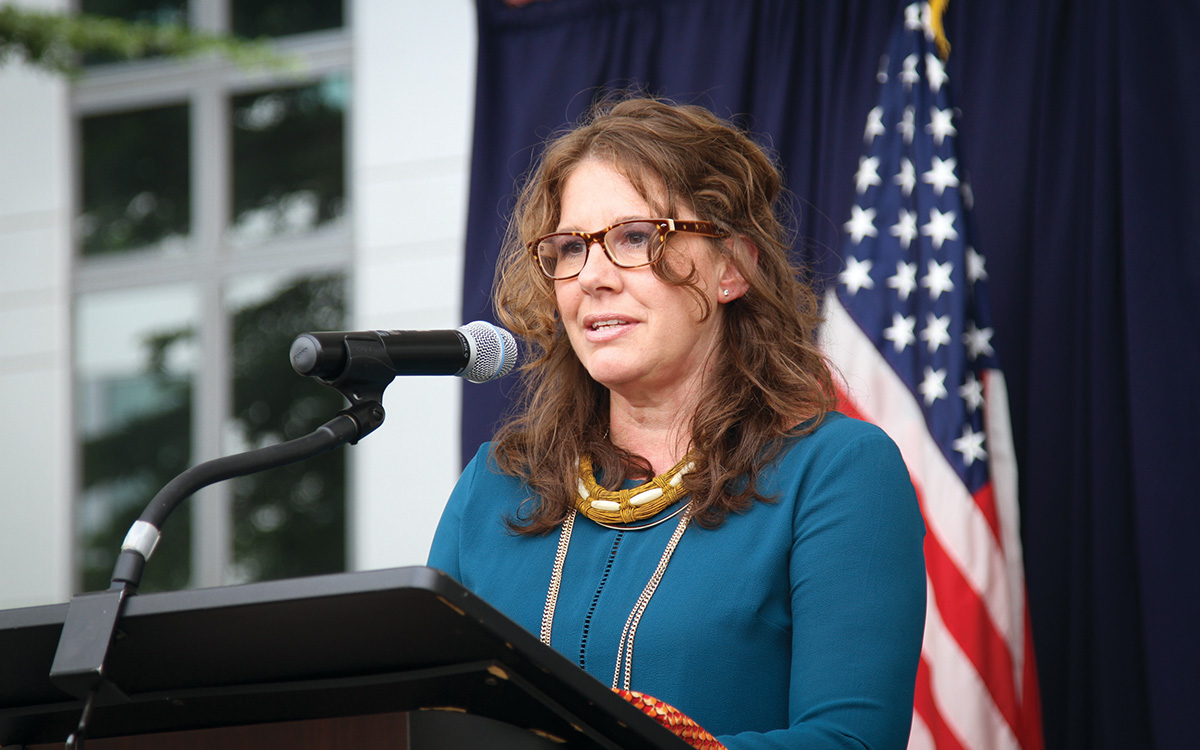
Bridgette Huerkamp delivers a tribute during the farewell ceremony for Ambassador James Entwistle and Dr. Pamela Schmoll in Abuja, Nigeria, 2016.
Nelson B. Delavan Award for an Office Management Specialist
BRIDGETTE HUERKAMP: GOING ABOVE AND BEYOND IN BANGLADESH
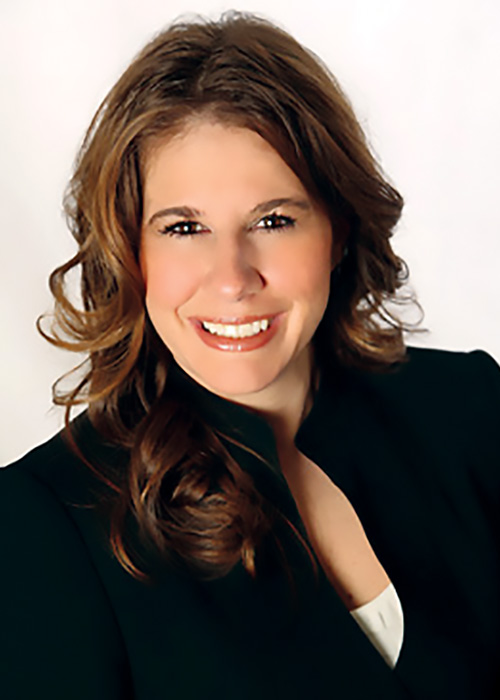
Bridgette Huerkamp.
Amid significant staffing gaps and remote work challenges arising from the pandemic, Embassy Dhaka relied heavily on Office Management Specialist Bridgette Huerkamp to navigate a period of crisis and keep the embassy community connected. She was selected for the 2021 Delavan Award for her outstanding support of mission goals and personnel.
Although she was assigned as the political-economic affairs OMS, Ms. Huerkamp also served as OMS for the ambassador and deputy chief of mission. Dedicated to mission continuity, and in response to minimal post staffing, she enthusiastically provided additional OMS support across multiple sections, uniformly excelling in each one.
As Embassy Dhaka prepared to respond to the pandemic, Ms. Huerkamp quickly identified the need to designate a large conference room for use as a virtual command center, a location where the embassy could provide essential and time-sensitive communications to many audiences and across platforms. The space was used to host regularly scheduled town halls where critical information regarding repatriation guidelines and CDC pandemic updates was provided to mission personnel and American citizens living in Bangladesh. In preparation for each meeting, Ms. Huerkamp proactively solicited input, designed topics and agendas, recruited speakers, assigned remarks and arranged logistics. This confidence-building communication also served as a lifeline in keeping the geographically dispersed team informed and connected to the embassy.
With many Americans rapidly departing Bangladesh in the spring of 2020, Ms. Huerkamp served as the direct liaison with the Royal Thai Embassy to coordinate the boarding of U.S. diplomats on multiple restrictive Thai Airways flights. She drafted flight clearance diplomatic notes and, as a Ministry of Foreign Affairs–identified contact, she was directly involved in coordination efforts. During the embassy’s multiple repatriation flights, she joined colleagues to staff the airport in support of more than 2,100 Americans scheduled to depart Dhaka.
Ms. Huerkamp described her participation in the undertaking as an honor. “I am proud of the work we accomplished as a team and as representatives of the United States to support the safety and security of our colleagues, the people of Bangladesh and thousands of Americans who were counting on us to get them home during the pandemic crisis,” she tells the Journal.
In the midst of a long-term crisis and while managing multiple responsibilities, Ms. Huerkamp played a vital coordination and editorial role in crafting responses to post’s 2019 Office of the Inspector General inspection, clearly articulating recommendations to the OIG’s satisfaction. She also cataloged and retired more than 36,000 files; coordinated the pol-econ section’s rolling reporting plan and the post’s working group manifest; developed the post’s travel manifest; and supported its 2020 integrated country strategy submission.
Simultaneously, Ms. Huerkamp managed country team and Emergency Action Committee coordination. Given shifting requirements from Washington and the immense volume of information for consideration arriving daily from the host nation, her work preparing EAC members for “Diplomacy Strong” discussions proved critical to sound decision-making.
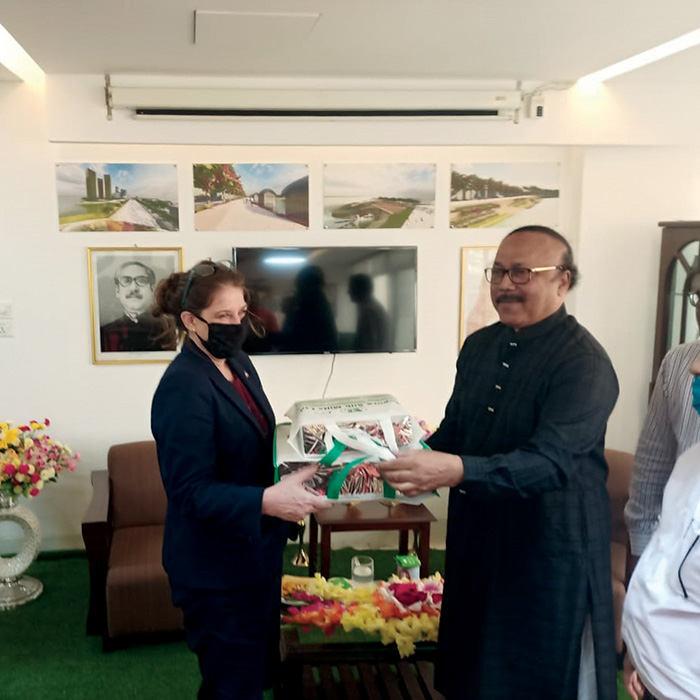
Bridgette Huerkamp (at left) receives a token of appreciation from the Mayor of Rajshahi, A.H.M. Khairuzzaman Liton, during U.S. Ambassador Earl Miller’s visit to discuss the regional implications of the pandemic, 2021.
As the embassy settled into its pandemic posture, Ms. Huerkamp provided extensive control officer duties during diplomatic engagements, including as primary logistics coordinator for the most extensive ambassadorial diplomatic engagement during her tour: a nine-day trip for the ambassador involving other diplomatic missions, amid myriad COVID-19 restrictions, to Bangladesh’s most politically sensitive regions, including Cox’s Bazar, the site of the world’s largest refugee population. If a particular embassy process was not making sense, Ms. Huerkamp advocated for change and, once approved, implemented it. For example, she developed a combined decision memo and briefing checklist to streamline efficiencies and revitalized front office guidelines.
Beyond her formal responsibilities, Ms. Huerkamp played a central role in the embassy community. While the embassy remained at minimal staffing, she catalyzed the facilities team to conduct long-overdue maintenance throughout the mission, repairing HVAC systems to improve air quality, sealing floors, painting and refurbishing interior spaces, and conducting a deep clean of community spaces and furnishings for health and sanitation purposes.
She also served as a barometer of post morale, advocating small day-trip excursions, regularly hosting small, socially distanced gatherings to celebrate special occasions, ensuring staff were officially Hailed and Farewelled, and organizing front office community events. During global authorized departure, she facilitated work and payment of numerous household staff and routinely checked on vacant residences. When the pandemic prevented the return to Dhaka of many of her colleagues, she personally coordinated and supervised the pack-out of their residences.
The pandemic brought economic hardship to many in Bangladesh, household staff in particular; Ms. Huerkamp provided food supplies and opened her home to offer various types of training to develop new skills and improve employment opportunities. She did this at some personal risk and without expectation of accolades, but for the good of the community. She subsequently supported returning personnel, new arrivals and those in quarantine, providing a warm welcome and ample provisions.
In praise of her efforts, the executive office characterized her thus: Ms. Huerkamp is “the type of diplomat you wish to see representing the United States. She hosts events with style, will dedicate as many hours as needed to deliver on priorities, regardless of the task, and has a rare ability to bring levity during serious times.”
Bridgette Huerkamp joined the Foreign Service in 2014. Prior to her tour in Bangladesh, she served in Nigeria and Cambodia. Previously she enjoyed a successful career in the corporate sector serving in management and executive-level administrative roles. Her portfolio required extensive international travel, which inspired a broad appreciation for diverse cultures and sparked her interest in joining the Foreign Service.
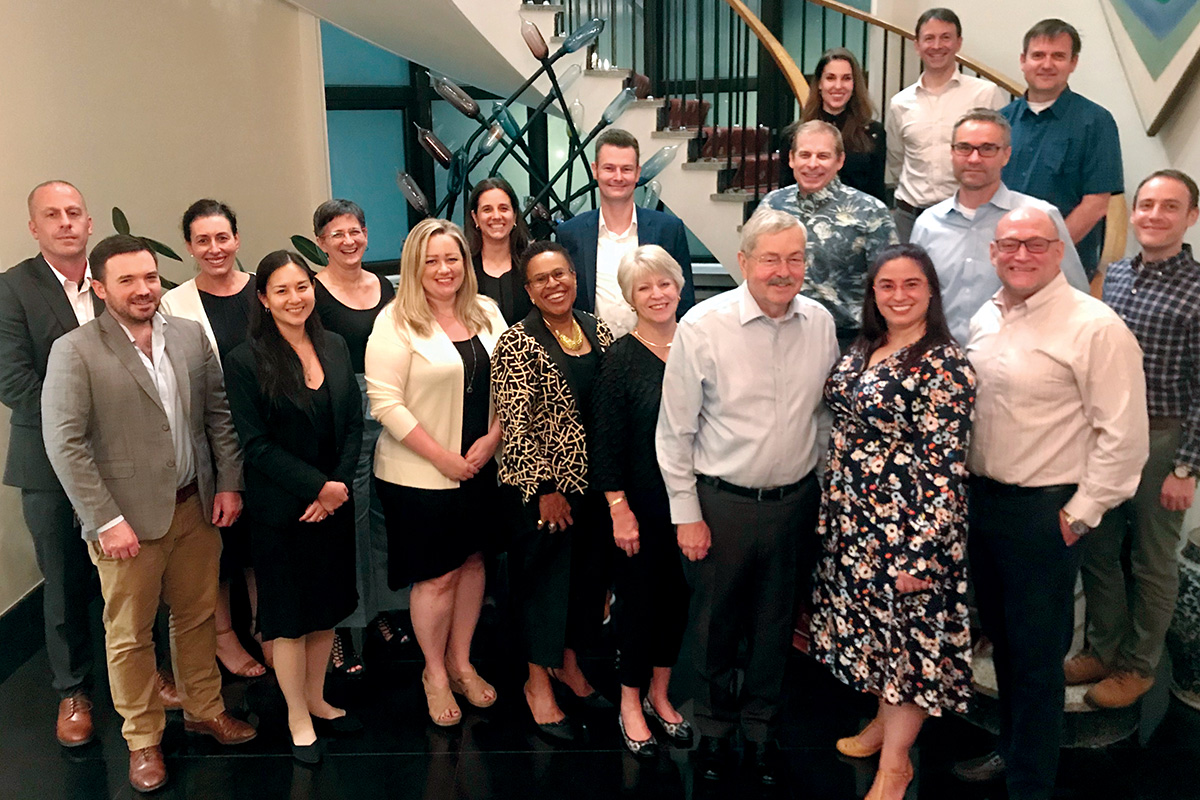
Alisse Sargeant (at left in back row) celebrates the return of mission colleagues with the homecoming taskforce at the ambassador’s residence in Beijing, China, in September 2020.
M. Juanita Guess Award for a Community Liaison Office Coordinator
ALISSE SARGEANT: REMAINING BEHIND TO TURN ADVERSITY INTO ACTION
Alisse Sargeant believes that the key ingredient to a thriving community at post is collaboration; and for those serving at Embassy Beijing, it was Ms. Sargeant herself who set an example of working hard in the service of others. When the pandemic hit, she was serving as a community liaison office coordinator (CLO) at her first overseas posting, Beijing. Working in challenging and unpredictable conditions because Mission China was the first post to be faced with COVID-19, she helped maintain cohesion throughout the mission and offered guidance to colleagues at embassies across Central Asia.
Embassy Beijing has 400 U.S. direct hires and more than 1,000 family members. With the pandemic originating in China and the bilateral relationship coming under great strain as a result, the CLO office was put to the test. Mission China went on Ordered Departure on Jan. 31, 2020. Many staff were already out of the country on vacation for the Lunar New Year holiday and were unable to return to post. In total, the mission lost 80 percent of its community.
“I, like most others in China, was away on holiday during Chinese New Year,” Ms. Sargeant recounts. “My husband and I made the decision to rush back to Beijing to support the mission in what we knew would be a difficult period. We were among the very few who had the option to remain at post, which brought with it the responsibility to channel opportunity into action.”
She coordinated with the Marines, the American Employee Association and embassy leadership to maintain the morale of those remaining, while also working closely with her evacuated colleagues to keep the community scattered throughout the U.S. connected and informed. Through a weekly newsletter, virtual town halls and social media groups, she distributed FAQs, mission notices and situation reports with the latest on the evacuation status, allowances and information on when and how staff and families would be able to return to post.
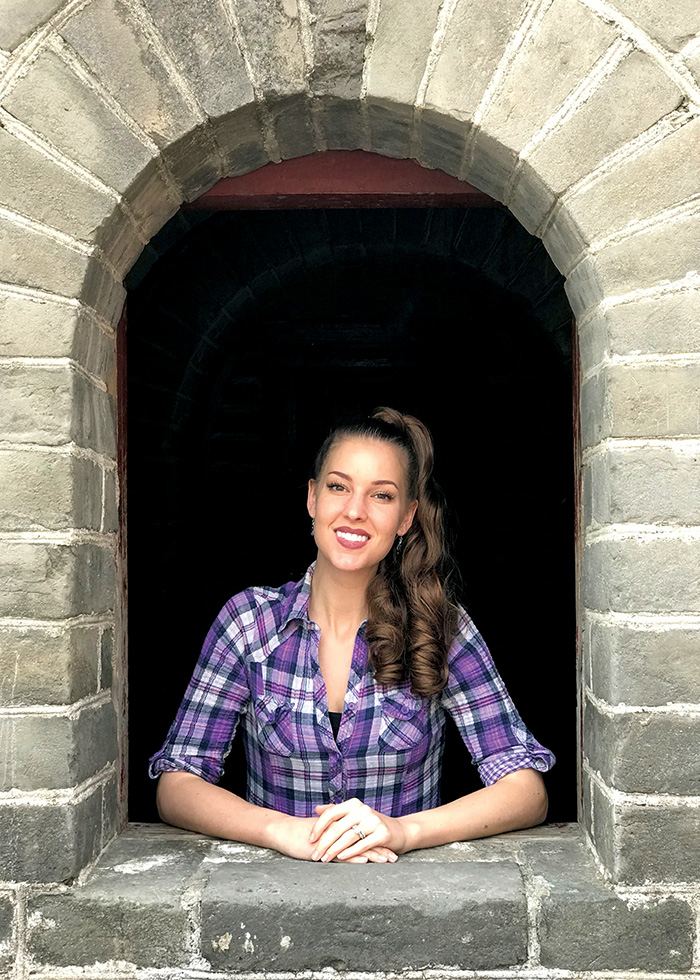
Alisse Sargeant.
Mission China set an example as the first post to go through pandemic evacuation and then bring its community back during the summer of 2020. Ms. Sargeant shared her experience with CLOs around the world. She was an essential member of the missionwide task force that brought more than 1,200 passengers from China to three U.S. cities on 11 charter flights within six weeks.
Once staff and families returned to post, they were required to spend two weeks in strict isolation. Ms. Sargeant and her team organized virtual events for those quarantined in Beijing and at the consulates, and also for colleagues in Ulaanbaatar and beyond. “For some posts that were just starting the return process, we offered our experiences and best practices, as well as links to our virtual events for them to join while in quarantine,” Ms. Sargeant says.
She then turned her efforts to re-forging a community. The Family Liaison Office’s guidance cable cited Embassy Beijing’s experience, as it quickly became a thriving community again, thanks to Alisse Sargeant’s leadership. Typical comments from an International Cooperative Administrative Support Services survey during her time at post praised her efforts. “The CLO team in Beijing is absolutely amazing,” reads one. “Alisse has done so much for the community.”
Ms. Sargeant combined excellent leadership and management skills with strong advocacy for the community. She mentored her staff while giving them room to use their own judgment. She sought training opportunities, then applied her learning to her own work and ensured her staff had the tools to be successful.
In preparation for the summer transfer season, when nearly the entire office transitions, Ms. Sargeant developed a simple knowledge-management system to keep the office on track across all eight areas of responsibility. She responded to difficult customers with compassion, maintained contact with the entire community, and reached out to sections and agencies to facilitate engagement on a wide variety of issues.
When CLO funding was cut by 70 percent as the result of closing a profitable AEA summer camp, Ms. Sargeant seamlessly shifted to raising enough money through a variety of smaller activities to fund other major community events, while simultaneously helping the AEA find new ways to earn money. In response to international travel restrictions, she identified local providers to organize trips throughout China.
Because the U.S. has no bilateral work agreement with China, Ms. Sargeant coordinated with the Bureau of Global Talent Management and the Women’s Leadership Group to create an annual “dual career” event to help families manage their options. She directed a new, professional-grade orientation video for Beijing (the first in 12 years), maintained close contacts with multiple schools and regularly mentored CLOs from the consulates.
“I’ll be forever grateful for and inspired by the spirit of the Foreign Service officers and their families, and I’m lucky to count myself among them,” Ms. Sargeant tells the Journal.
Before moving to Beijing with her FS husband in 2018, Alisse Sargeant worked in education as the executive director of a childcare center. She has returned to her work in childcare in the greater Seattle area as the couple awaits their next assignment.
Avis Bohlen Award for a Foreign Service Family Member
AMANDA JAGER: SUSTAINING COMMUNITY THROUGH LOCKDOWN IN INDIA
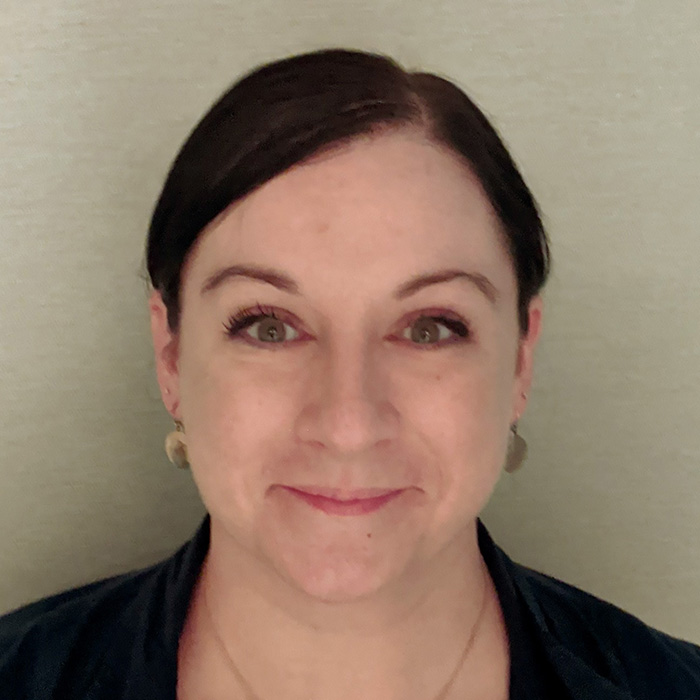
Amanda Jager.
During her family’s first overseas assignment after joining the Foreign Service, Amanda Jager provided extraordinary assistance to the U.S. Embassy New Delhi community amid the host country’s greatest mortality crisis since its independence.
India had just announced what would prove to be one of the longest and most restrictive COVID-19 lockdowns in the world when Ms. Jager was appointed vice president of the American Community Support Association at the embassy. Many board members had recently departed post, prompting Ms. Jager to assume responsibilities far beyond the scope of her position as she helped to manage the association’s expansive offering of services for U.S. and third-country diplomats and their families.
In particular, the commissary and restaurant became a lifeline for the community, one of the few places to safely and reliably purchase groceries. Despite the lockdown and associated supply shortages, Ms. Jager ensured that the commissary never lacked essential items. Meanwhile, thanks to her advocacy, the restaurant offered takeout and delivery to embassy employees working around the clock—including her husband—to arrange repatriation flights for thousands of U.S. citizens.
Ms. Jager’s concern for the community’s well-being quickly earned her the moniker “mayor of the compound” with nearly everyone, including the front office. When police checkpoints became difficult to transit, she worked with mission security personnel to ensure staff had all the supporting documentation and credentials required to safely travel to and from work. Ms. Jager also kept everyone informed as she worked closely with senior leadership and the health unit to ensure facilities could reopen safely.
The “Commissary Inclusivity Initiative” represented a concerted effort to listen to often-marginalized members of the community and advocate for their needs.
Inevitably, some ACSA members disagreed with embassy policy and directed their frustrations toward the association’s staff. Ms. Jager was always the first to field these calls, adeptly calming tempers while still maintaining strict adherence to medical guidelines. As a result of these protocols, and her enforcement of them, not a single case of COVID-19 was transmitted at ACSA functions or facilities.
“When the pandemic hit, we really had to get creative,” Ms. Jager says. “I worked with our medical team through the mission’s COVID Working Group to come up with safe, socially distanced fun to help alleviate the stress of being locked down. It was a lot of work, but it was rewarding to know that what we did helped provide some much-needed relief.”
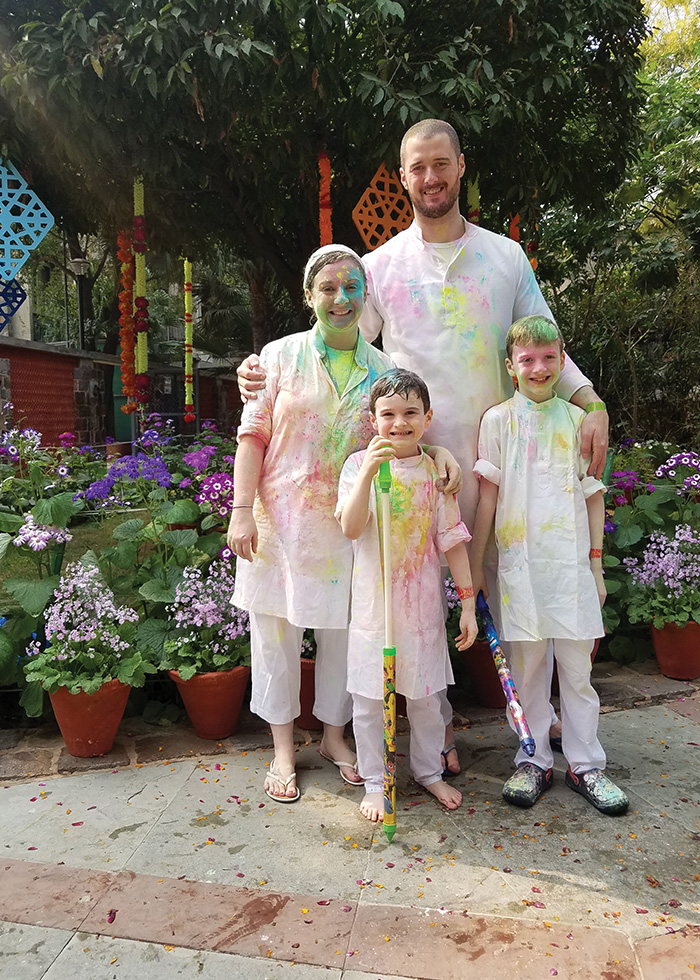
Amanda Jager and her family celebrate Holi at the American Embassy School in New Delhi, 2019.
As the first lockdown lifted, Ms. Jager organized an award ceremony to recognize the efforts of the ACSA staff. Ambassador Kenneth Juster used the occasion to personally thank her and the staff for “keeping ACSA open and the morale of our community afloat” despite unprecedented challenges.
Shortly thereafter, as racial equality movements spread across the U.S., Ms. Jager felt moved to consider how the commissary could better serve its diverse customers. She launched the “Commissary Inclusivity Initiative,” which evaluated inventory patterns and stocked the commissary with hair and skin care products for persons of color that were not locally available and impossible to ship to post.
“I reached out to another EFM who was a woman of color because I wanted to get it right. We then started our inclusivity initiative to make sure that everyone at the mission was represented in the products we stocked and the events we held. This is one of the things I am most proud of accomplishing during my time at post.”
The success of the program quickly spread to the ACSA branch at the U.S. consulate in Mumbai. Beyond simply expanding product availability, the initiative represented a concerted effort to listen to often-marginalized members of the community and advocate for their needs.
Ms. Jager showed her dedication to the community in myriad other ways, offering guidance to parents at the American Embassy School, creating social media community groups and personally delivering groceries every day to dozens of incoming families in quarantine.
She tells the Journal that she feels truly honored to have been chosen for this recognition, and wishes to dedicate the award to “so many other amazing EFMs out there who stepped up during this crisis, rolled up their sleeves and went to work to help their communities. This is what it is to be a part of the State Department: working together. I am so grateful to be a member of this community.”
Amanda Jager currently lives in London with her husband, a consular officer, and their two young sons.
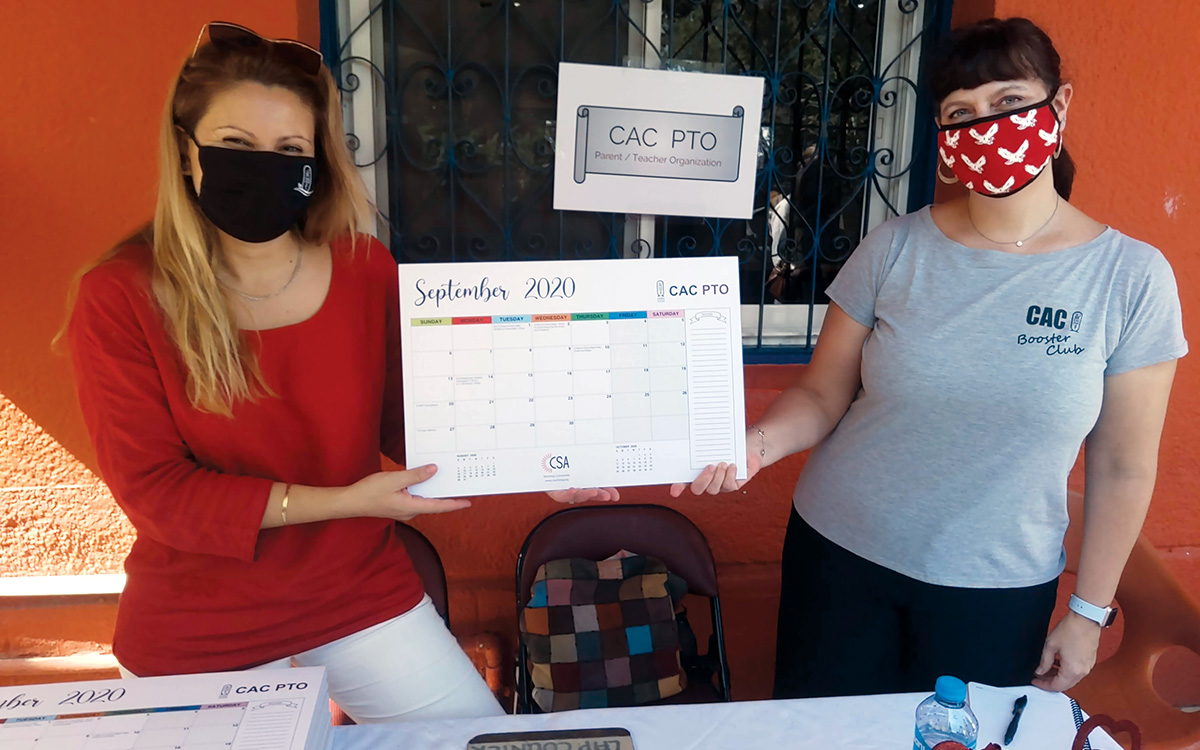
Ivana Lawrence (at left) and Carmen Allison, president of the CAC Booster Club, sell calendars at a fundraiser to benefit the PTO.
Avis Bohlen Award for a Foreign Service Family Member
IVANA LAWRENCE: ENGAGING CAIRO EXPAT FAMILIES IN A SEASON OF DISTANCING
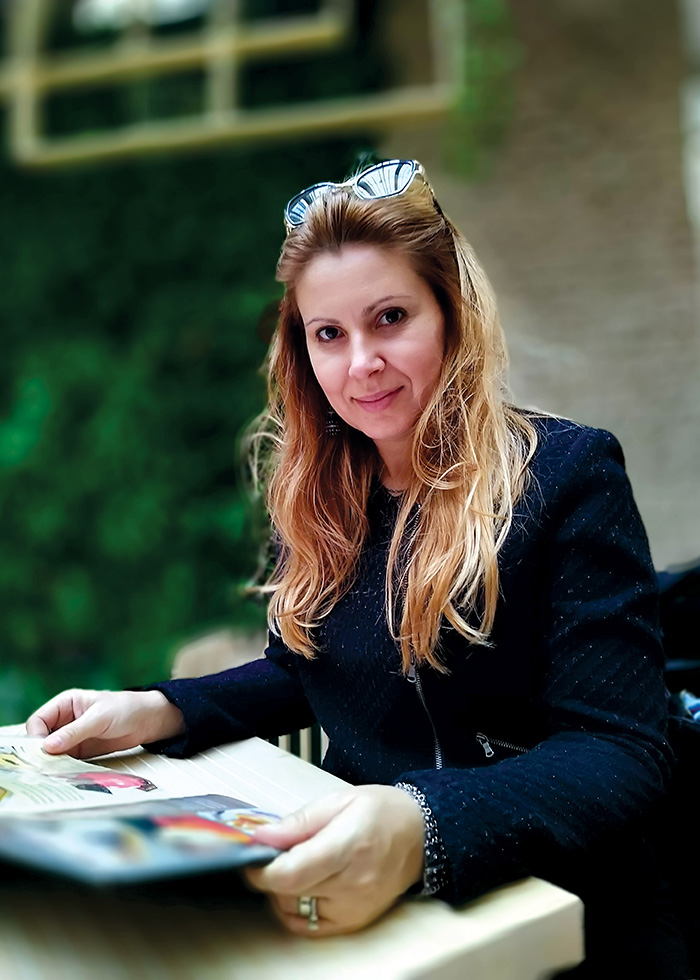
Ivana Lawrence.
During 2020, the worsening pandemic brought new apprehensions to families residing overseas. For American families transitioning to Egypt, as well as the entire Maadi Cairo community of school-aged children and their parents, Ivana Lawrence provided crucial support and reassurance in the midst of uncertainty.
Throughout her four years in Cairo, Ms. Lawrence chose to be actively involved with the Cairo American College, the school where a majority of U.S. expatriate children enroll. Because of her consistent support for CAC’s many initiatives, Ms. Lawrence was chosen to serve as president of the parent teacher organization (PTO) for the 2020-2021 school year. What was remarkable about her approach was her focus on organizing closer collaboration between parents and the school administration.
“I approached this more as a job than as a volunteer position,” Ms. Lawrence says of her work. “We established a strong partnership with the school administration and the board of trustees, in close communication with the embassy CLO [community liaison office coordinator]. We relied on each other to find creative, pragmatic ways for our community to thrive and shared the idea that we are one big family with the same desire: the best experience for our children despite the pandemic. Together, we chose action over fear.”
The wisdom of this approach was thrown into sharp relief at the height of the pandemic in 2020, when the U.S. embassy facilitated more than 50 American staff family transitions into Cairo. Ms. Lawrence seized the opportunity to strengthen the communications that PTO managed. Under her leadership, a new plan took advantage of all media platforms, weaving them together into a seamless social media communication strategy to reach hundreds of families from more than 50 countries.
As the PTO president, Ms. Lawrence orchestrated a COVID-safe welcome and orientation seminar for families joining the school, giving newly arrived mission families a guidebook to the neighborhood, as well as a chance to meet others when the embassy was not able to hold in-person events. Ms. Lawrence also personally reached out to new families, speaking with each individually and helping them feel accepted and less anxious. As CLO Margaret Friar reported: “Ivana is a natural community builder, and she has definitely made our mission and the CAC school environment for families better in Cairo.”
Despite the school’s elaborate social distancing strategy and hygiene training, many incoming parents still felt uncertain about in-person learning at the beginning of the school year. Ms. Lawrence took the lead in encouraging CAC’s head of school to participate in two Q&A sessions for parents. These virtual events quickly exceeded attendance capacity, prompting Ms. Lawrence’s team to create a transcript and circulate it throughout the community. With their concerns addressed, parents overwhelmingly supported the reopening plan.
Most memorable about Ms. Lawrence’s innovative approach was her creation of “CAC Talks,” a series of virtual community discussions on popular subjects of concern for families. Modeled after “TED Talks,” each session was led by a subject matter expert, facilitated by the PTO under Ms. Lawrence’s leadership, and covered such topics as overcoming COVID-19 anxiety, addressing gender and race issues and combating misinformation.
Most memorable about Ms. Lawrence’s innovative approach was her creation of “CAC Talks,” a series of virtual community discussions on popular subjects of concern for families.
In April 2021, CAC’s board of trustees presented Ivana Lawrence with the school’s Core Value Award, an annual recognition given to those who best exemplify the school’s core values of integrity, creativity, perseverance, courage, respect, responsibility and compassion. The embassy’s minister counselor for management affairs, Randall Budden, who also sits on CAC’s board, notes that Ms. Lawrence “volunteered more hours than anyone, and changed the PTO into a diverse, inclusive community outreach organization.”
Ms. Lawrence believes that communities at post around the world stand to benefit from intentionally engaging beyond their American cohort. “In the Foreign Service, we are called upon to move frequently,” she tells the Journal. “But too often, we’re left in a bubble that’s hard to break out of, and we hardly get to experience the local culture. I found that PTOs have this amazing ability to bring us all together and show what marvelous experiences, projects and friendships can happen on a larger scale. Receiving the Avis Bohlen Award gives me a platform to showcase this approach so it can inspire replication. It offers great insight into the powerhouse that we, the ‘trailing spouses,’ are, and the positive impact we can have in our communities.”
Born in the former Yugoslavia, Ivana Lawrence lived through the siege of Sarajevo and experienced refugee life in Croatia as a child. She worked as a journalist and news anchor for the first independent radio stations in the region. Today she is an accomplished translator and interpreter in three languages. Always looking for ways to promote community building, she organized many diplomatic and public cultural events while working for the Swiss embassy in Sarajevo. She currently lives in Rwanda with her husband, Benjamin Lawrence, a contracting officer for USAID; their two sons, Dominic and Noah; and her mother, Vesna Varunek.
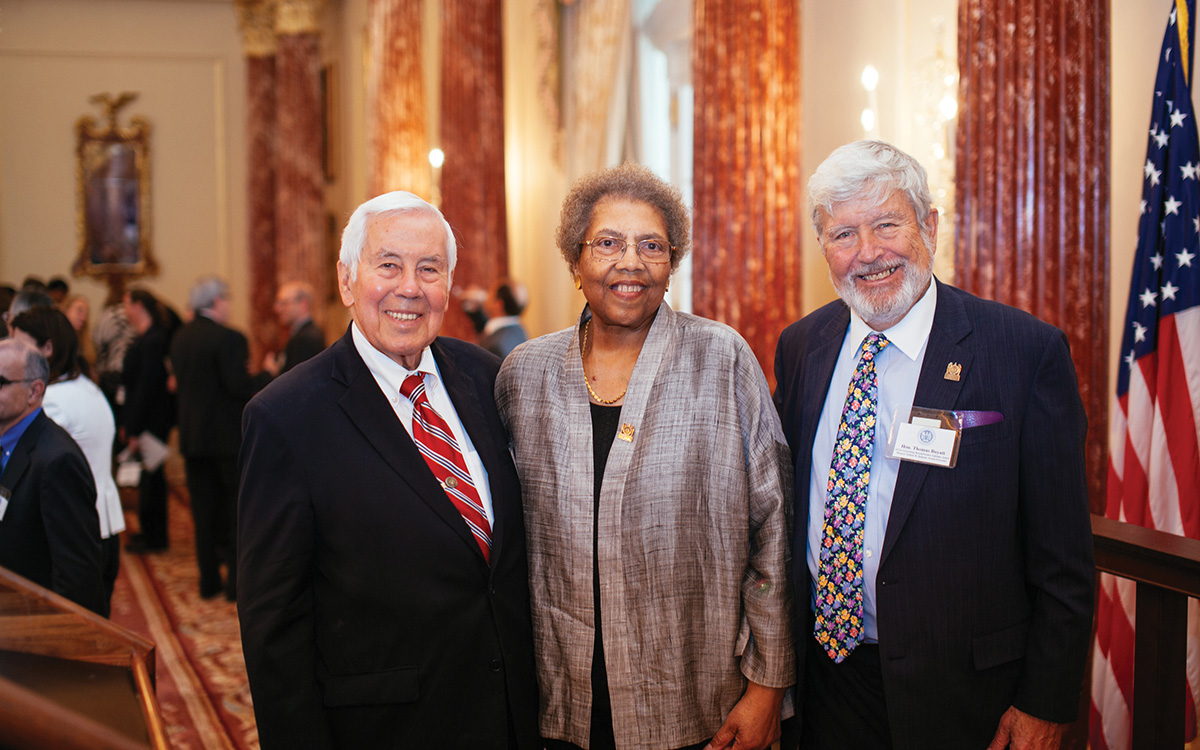
Ambassador Thomas Boyatt (at right) at the AFSA awards ceremony in June 2016, pictured with fellow recipients of AFSA’s Award for Lifetime Contributions to American Diplomacy, Ambassador Ruth A. Davis (center) and former Senator Richard Lugar (at left).
AFSA
AFSA Achievement and Contributions to the Association Award
THOMAS D. BOYATT: BRINGING MAJOR INNOVATIONS TO THE ASSOCIATION
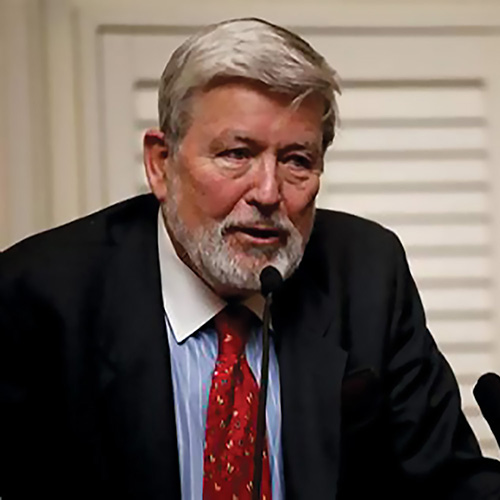
Ambassador Thomas Boyatt.
AFSA
For more than 60 years, Ambassador (ret.) Thomas Boyatt has played a major role in the success and evolution of the American Foreign Service Association. Two decades ago, AFSA honored him with the 2001 AFSA Achievement and Contributions to the Association Award in recognition of his enormous contributions to AFSA from the 1960s through the 1990s, notably in leading AFSA to victory over the American Federation of Government Employees to establish AFSA as the Foreign Service union in 1973.
During the past 20 years, Amb. Boyatt has not only continued to contribute to AFSA, including serving as a Governing Board member multiple times, but in doing so he has led four major innovations that strengthened AFSA’s role as the voice of the Foreign Service, both as a professional association and a labor union.
Political Action Committee. While serving as AFSA treasurer from 2001 to 2003, Amb. Boyatt led the way to the establishment of AFSA-PAC, a political action committee to engage with members of Congress and congressional candidates and advocate on issues of significance to the Foreign Service.
The Governing Board was initially wary of becoming involved in politics after 78 years of not doing so, but Amb. Boyatt convinced the board that the initiative would benefit AFSA and that the committee could and would operate in a nonpartisan fashion. The board approved the move in February 2002. Amb. Boyatt served as the new AFSA-PAC’s treasurer, the senior PAC officer, for the next six years, guiding its activities.
During the past 20 years, PAC contributions to congressional candidates have opened the doors for AFSA representatives to make personal pitches to powerful senators and representatives regarding Foreign Service pay and benefits, funding for diplomacy and development, and other issues.
Foreign Affairs Council. It was Amb. Boyatt’s idea in 2002 to bring together a dozen foreign affairs organizations under one umbrella to jointly advocate for the interests of the U.S. Foreign Service. Those organizations include AFSA, the American Academy of Diplomacy, the Association of Black American Ambassadors and the Foreign Service Youth Foundation.
As FAC president since 2002, Amb. Boyatt has made the case for funding for diplomacy and development in testimony before Senate subcommittees, in written FAC reports that he co-authored, in press conferences and in meetings with successive Deputy Secretaries of State. He still leads the FAC today, and expects to lead it in an initial meeting with Secretary Antony Blinken’s senior management team when the COVID-19 situation permits a face-to-face meeting.
During the past 20 years, Amb. Boyatt has led four major innovations that strengthened AFSA’s role as the voice of the Foreign Service, both as a professional association and a labor union.
Foreign Service Grievance Board. While serving as AFSA’s retiree vice president from 2015 to 2017, Amb. Boyatt suggested that the Governing Board become actively involved in the previously staff-coordinated process of nominating Foreign Service retirees to serve on the Foreign Service Grievance Board and Foreign Service Labor Relations Board.
Beginning in 2015, and continuing through his term as AFSA secretary from 2017 to 2019, Amb. Boyatt actively recruited distinguished retirees to be nominated for those boards, with a focus on seeking those who strongly support the rights of employees. The benefits of that effort can be seen in the January 2021 FSLRB decision in which two FSLRB members recruited by Amb. Boyatt ordered the State Department to award meritorious service pay increases to hundreds of employees.
AFSA Bylaws Amendments. While serving as AFSA secretary from 2017 to 2019, Amb. Boyatt chaired the Governing Board committee that proposed substantial revisions to the AFSA Bylaws.
Faced with disagreements between the AFSA president and other Governing Board members concerning a series of decisions regarding AFSA operations, staffing and expenditures, Amb. Boyatt drafted amendments to the association bylaws that specified the issues on which the AFSA president must consult with the executive committee and the full Governing Board. The AFSA membership overwhelmingly approved those amendments.
In summary, while serving in three different positions on the Governing Board since 2001, Amb. Boyatt led four major innovations that strengthened AFSA as an organization, increased its operational efficiency and made it a more powerful advocate for the interests of the career Foreign Service.
It is for these reasons that Amb. Boyatt, who now resides in Charlottesville, Virginia, is richly deserving of the 2021 AFSA Achievement and Contributions to the Association Award.
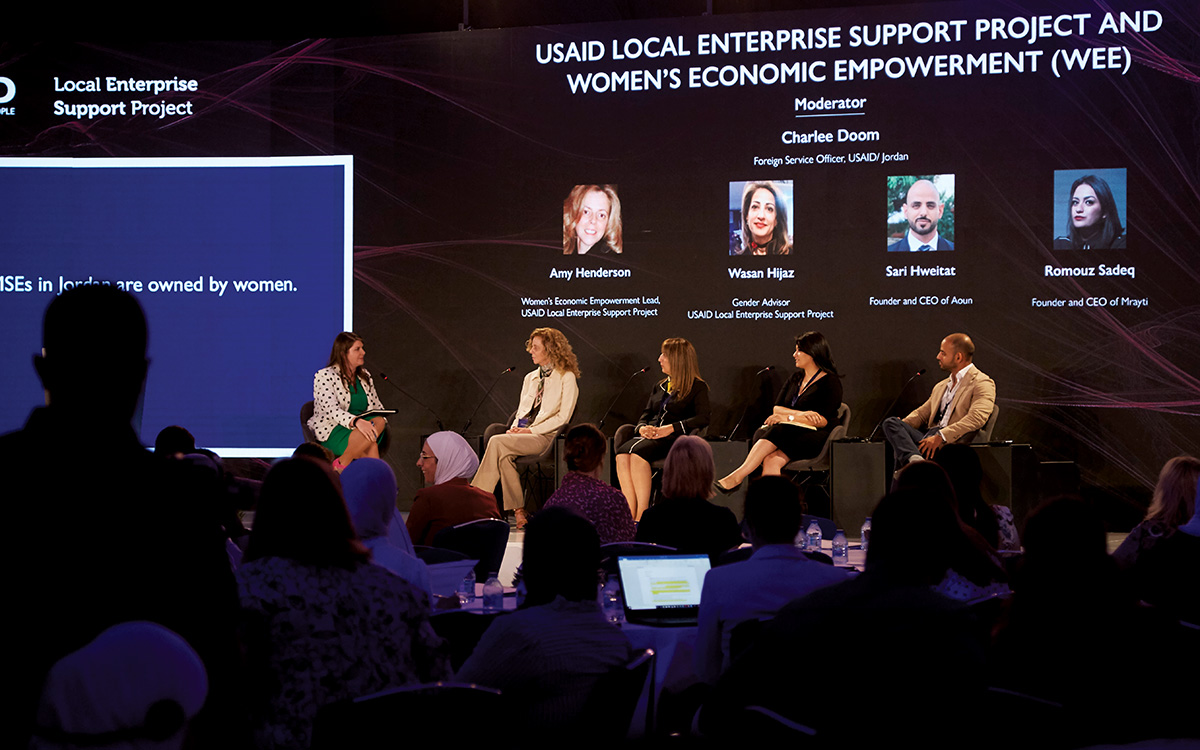
Charlee Doom (at far left) moderates a panel on USAID’s Local Enterprise Support Project and Women’s Economic Empowerment in Amman, Jordan, in 2020.
AFSA Post Representative of the Year
CHARLEE DOOM: TWO-TIME WINNER GOES BEYOND THE CALL OF DUTY
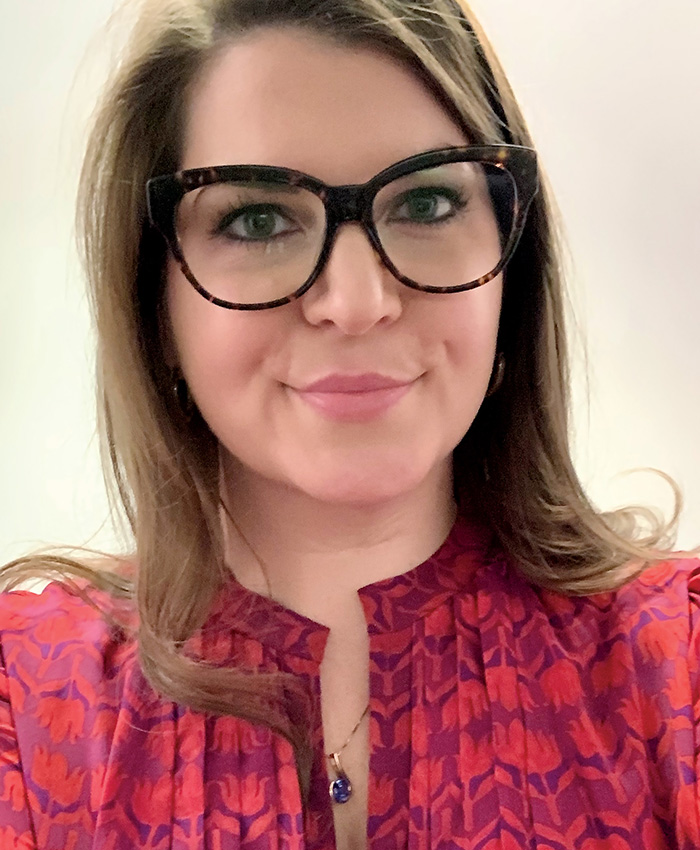
Charlee Doom.
Charlee Doom, a USAID Foreign Service officer, regularly goes beyond what is expected of an AFSA post representative. Serving as a post rep for a second time, this time in Amman, she not only helped AFSA members in Jordan’s capital, but also those from her previous post, Nairobi. She even helped members from other posts where she had not served.
For her exceptional efforts in Amman from 2018 to 2020, Ms. Doom has been selected as the AFSA Post Representative of the Year for a second time. She also received the award in 2015 for her work at Embassy Nairobi.
“Serving as an AFSA post representative is an incredibly rewarding element of my service as an FSO,” Ms. Doom says. “Having an opportunity to advocate with and on behalf of my colleagues and to work strategically with AFSA staff affords a special window into a broader view of the Foreign Service. Earning this award for a second time for effectively supporting and advocating with and for my colleagues, and hopefully making their lives easier or less stressful, is a tremendous honor.”
Ms. Doom stood out for her activism on behalf of members, her willingness to manage complex issues from post and to intervene directly with a range of Washington actors, including USAID’s Office of Civil Rights and Diversity, and for the sophisticated nature of her interactions with the AFSA USAID VP’s office.
Ms. Doom knows the Foreign Affairs Manual and the USAID Automated Directives System well. She frequently researched answers to member questions rather than referring them to others. A number of Ms. Doom’s former constituents from Nairobi chose to continue working with her, even after her departure for Amman, on cases that persisted until nearly the end of her Amman tour.
Ms. Doom managed more than 15 complex individual personnel matters from Amman, including one security case in which an officer had virtually no support at post, but with AFSA assistance, the officer was eventually able to exonerate herself of all wrongdoing. Ms. Doom has such a strong reputation as an AFSA rep that she occasionally took on cases from posts where she had never served. She also acted informally at several posts where there was no AFSA post rep. The AFSA USAID VP’s office looked to Ms. Doom as its go-to rep when her counterparts at other missions sought peer advice or counseling, or needed a model of how to be successful as an AFSA rep.
On institutional matters, Ms. Doom was instrumental in convincing high-ranking personnel at one large post to abandon their threats to retaliate against officers who sought to go on authorized departure as a result of the pandemic. In this she worked not only with AFSA but also with State’s Bureau of Medical Services. In the context of a heavy VIP visitor load necessitating extensive overtime, Ms. Doom also played a key role, along with fellow post rep Daniel Devries, in convincing mission leadership to honor overtime payment regulations; failure to honor these regulations had resulted in low morale and resentment among at least 60 affected members.
The AFSA USAID VP’s office looked to Ms. Doom as its go-to rep when her counterparts at other missions sought peer advice or counseling, or needed a model of how to be successful as an AFSA rep.
“I managed several complex situations,” Doom says. “One that was particularly challenging was assisting a post where officers had received guidance from leadership that if they chose to go on COVID-19 authorized departure, they would face career repercussions. Several officers at that post were understandably concerned for both their and their family’s health, as well as their own careers. Working with AFSA headquarters in Washington to address this situation, we were able to convince leadership at that post to retract and shift their position, and several families then went on AD.”
Ms. Doom hosted periodic meetings for AFSA membership at posts where she was the rep. She has been able to convince employees of the benefits of membership, increasing enrollment in AFSA by five to 10 persons per year.
Charlee Doom began her diplomatic career with USAID a decade ago. She has served in Kenya, Somalia and Jordan. In August, she began a tour in Timor-Leste. Before joining USAID, she worked at Bunge Global Agribusiness, BASF, The Chemical Company and Monsanto, where she specialized in global commodity trade and global strategic marketing for agricultural chemicals and non-GMO seed traits.
Ms. Doom completed her bachelor’s degree in agricultural economics at the University of Kentucky and an MBA at the University of Western Australia while serving as a Rotary Ambassadorial Scholar. She is currently completing an executive certificate in economic development at the John F. Kennedy School of Government at Harvard University. She speaks Kiswahili and is studying Tetum, an official language in Timor-Leste.
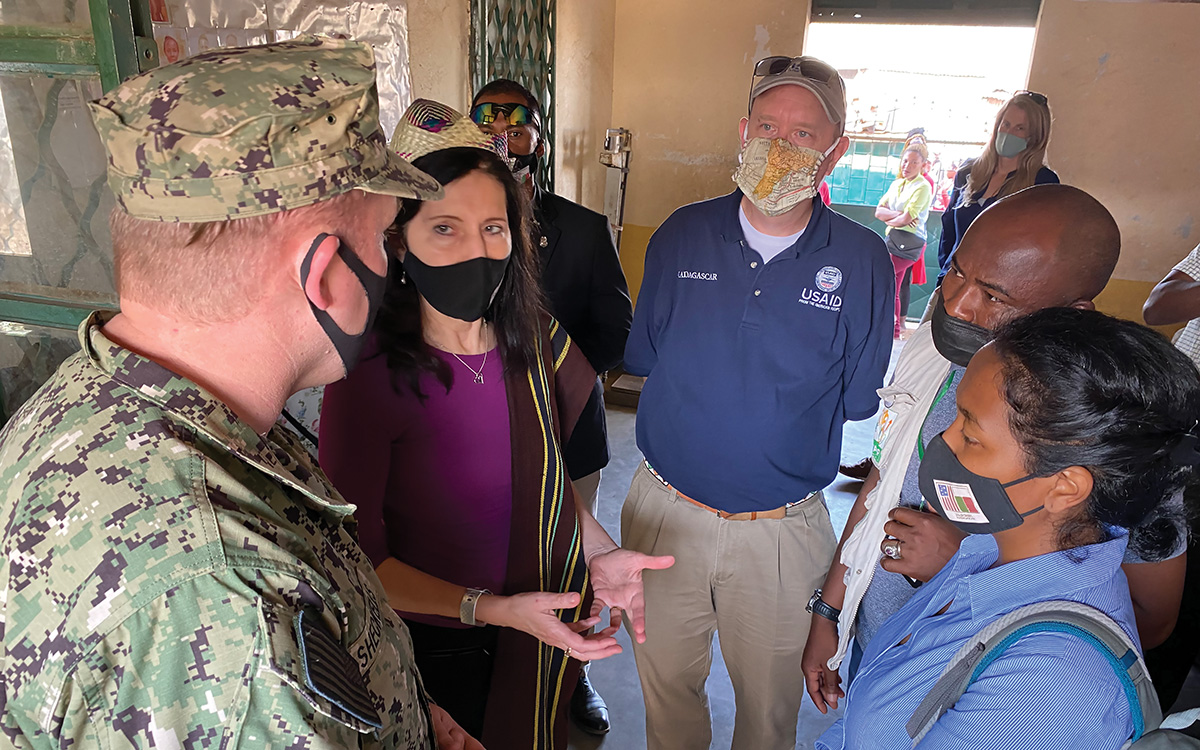
Randy Chester (center) escorts Ambassador Amy Hyatt (at Chester’s right) during a visit to a USAID humanitarian assistance food distribution warehouse operated by UNICEF in Ambovombe, Madagascar, in the summer of 2021.
AFSA Post Representative of the Year
RANDY CHESTER: EXPANDING EMPLOYEE RIGHTS AT U.S. MISSION PAKISTAN
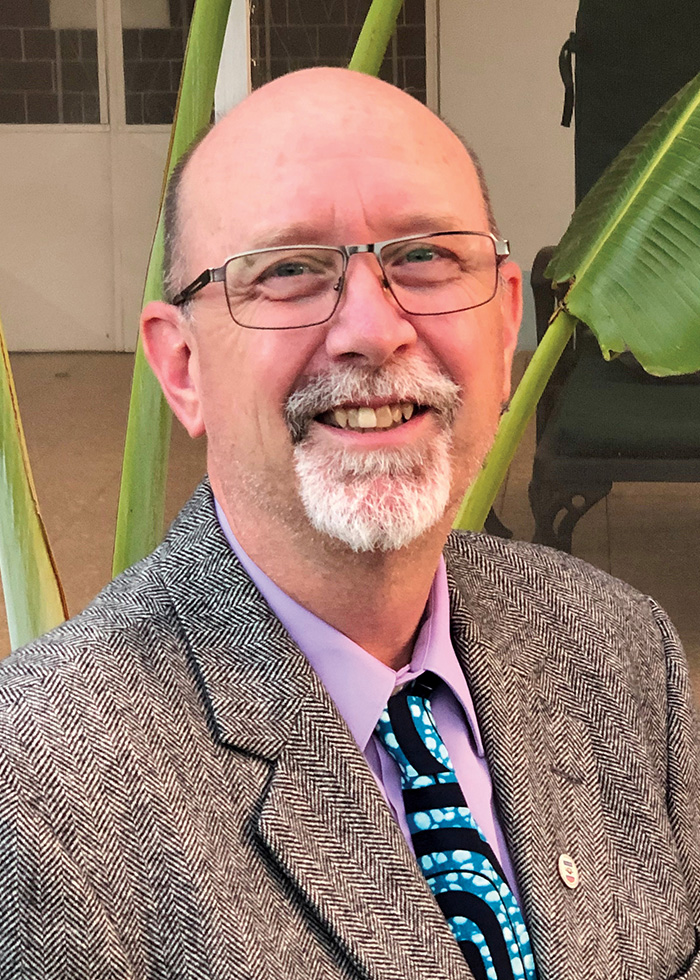
Randy Chester.
Even before joining USAID, Randy Chester was a longtime union member. In college, he joined the Teamsters and his local grad school union. When he joined USAID in 2004, he was excited to be able to join AFSA soon after his swearing-in as a Foreign Service officer. He became AFSA’s post representative in Islamabad in 2018.
“Unions have been and continue to be an important force in promoting labor rights, a supportive work environment conducive to personal and professional growth, and the space to advocate for and engage in constructive dissent with management,” he says. “These past 18 months under COVID-19 restrictions further strengthened my belief in the need for continued strong union representation.”
Randy Chester served as a valued mentor, adviser, bridge to management and spokesman for 40 AFSA members in Islamabad, one of the most challenging posts in the Foreign Service. Because there was no AFSA rep for the State Department in Islamabad, he expanded his volunteer duties to include State employees serving there.
“During my two years as AFSA rep, I learned that often, just being heard is what FSOs need,” he says. “While advocacy was important, especially in the early days of the global authorized departure due to the pandemic, being a sounding board for concerns and complaints helped staff through a difficult time.”
Mr. Chester was instrumental in making the case that unaccompanied posts such as those in Pakistan faced unusual difficulties in managing both drawdowns and skeletal staffing during the COVID-19 pandemic. Some officers had to evacuate on 48 hours’ notice against their wishes, while others were obliged to stay despite hoping to join family elsewhere.
Many employees had families sheltering in locations other than the United States, necessitating additional dislocations and separations in dangerous travel circumstances. Mr. Chester helped dozens of anxious employees make decisions about where they would spend lockdown and how to telework most productively.
“Talking with my colleagues across agencies, I collected their fears, questions and ideas to address the uncertainty,” he says. Mr. Chester sent policy recommendations to the AFSA USAID vice president’s office advocating specific guidance for unaccompanied posts. At town halls, he continually pressed senior leadership to reexamine the policy and address the uniqueness of critical priority country (CPC) posts. It was in part due to his efforts that USAID eventually issued instructions tailored to these locations.
“Additionally, during the town hall meetings, I asked leadership to reconsider requiring FSOs to evacuate to the U.S. if their family was safe-havened at a post with limited COVID-19 impact,” he says. The advocacy led to positive results: USAID published a specific gender and development policy for CPCs that accounted for the uniqueness of serving at a one-year post. “The evolution in policy reaffirmed my belief in the necessity of union representation and the importance of fairness in the workplace.”
“These past 18 months under COVID-19 restrictions further strengthened my belief in the need for continued strong union representation.”
Mr. Chester is an excellent team-builder. In advance of USAID, State Department and AFSA town hall gatherings related to the pandemic (and to the promotion process in a tumultuous year), he polled the AFSA membership at his post to determine the kinds of questions employees had. If individuals did not wish to pose those questions themselves, he raised them on behalf of his constituency, serving as the voice for dozens of more junior employees at the mission.
Thanks to Mr. Chester’s thorough knowledge of the Foreign Affairs Manual and the USAID Automated Directives System, he has spent many lunch hours counseling AFSA members about what they need to know about their rights.
On group matters beyond those related to the pandemic, Mr. Chester assisted several entry-level USAID officers whose tenure was inadvertently held up for three years, advising State personnel about how the two agencies could work together more productively to resolve the situation. He also provided guidance to a number of Civil Service employees trying to make the complicated switch to the Foreign Service. He played a helpful role in several discrimination cases, and generally kept morale up among a group of employees who felt discouraged by circumstances.
Mr. Chester joined USAID in 2004 and has served in Afghanistan, Bosnia and Herzegovina, Ethiopia, Tanzania and Pakistan. In Pakistan, he was the director of the mission’s Khyber-Pakhtunkhwa Regional Office, overseeing a dynamic $1 billion portfolio aimed at mitigating and countering the influence of violent extremism on the border with Afghanistan. He has previously served as an agriculture officer, private sector officer and energy officer. In May, he joined the USAID/Madagascar Mission as the new director of the Integrated Development and Emergency Assistance Office.
Prior to joining USAID, he worked for an environmental think-tank in Washington, D.C., and as a Peace Corps volunteer in Senegal. He holds M.S. degrees from the University of California–Davis, in agricultural economics and international agricultural development.








